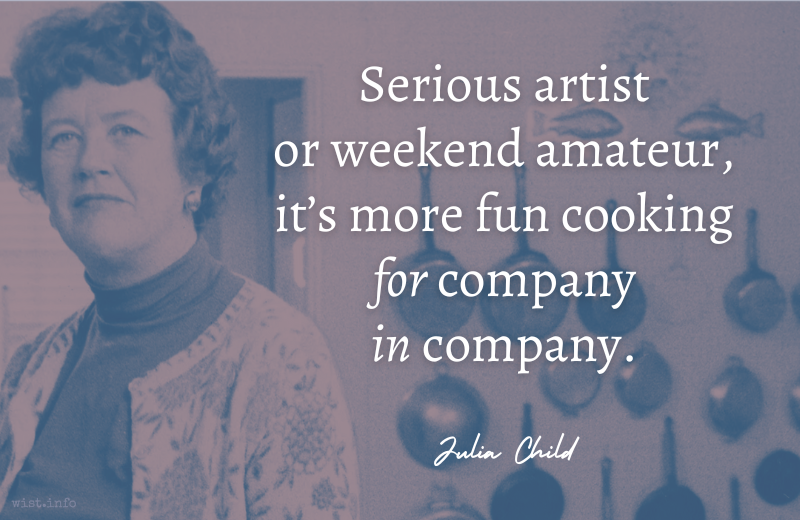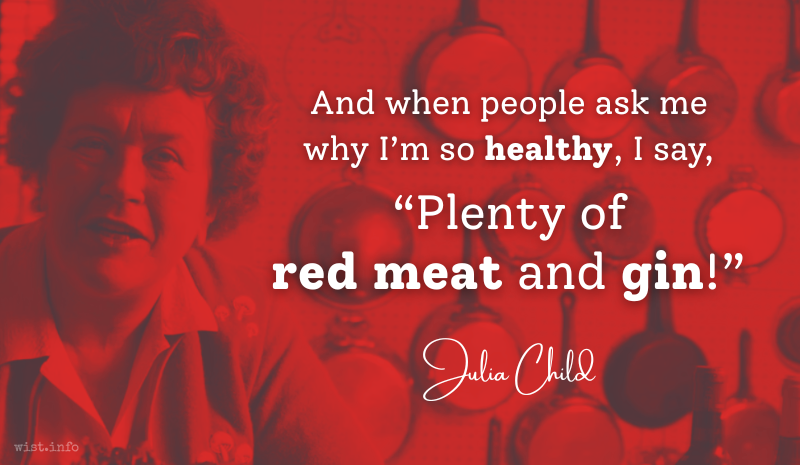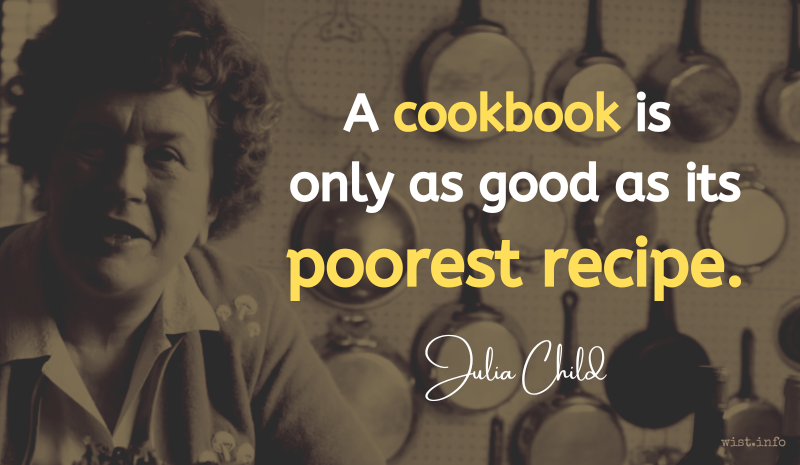I don’t eat between meals. I don’t snack. Well, I do eat those little fish crackers. They’re fattening, but irresistible.
Julia Child (1912-2004) American chef and writer
“What I’ve Learned,” interview by Mike Sager, Esquire (2001-06)
(Source)
Quotations by:
Child, Julia
Moderation. Small helpings. Sample a little bit of everything. These are the secrets of happiness and good health. You need to enjoy the good things in life, but you need not overindulge.
Julia Child (1912-2004) American chef and writer
“What I’ve Learned,” interview by MIke Sager, Esquire (2001-06)
(Source)
The measure of achievement is not winning awards. It’s doing something that you appreciate, something you believe is worthwhile. I think of my strawberry souffle. I did that at least twenty-eight times before I finally conquered it.
I’m awfully sorry for people who are taken in by all of today’s dietary mumbo jumbo. They are not getting any enjoyment out of their food.
Drama is very important in life: You have to come on with a bang. You never want to go out with a whimper. Everything can have drama if it’s done right. Even a pancake.
I don’t think about whether people will remember me or not. I’ve been an okay person. I’ve learned a lot. I’ve taught people a thing or two. That’s what’s important. Sooner or later the public will forget you, the memory of you will fade. What’s important are the individuals you’ve influenced along the way.
Always remember: If you’re alone in the kitchen and you drop the lamb, you can always just pick it up. Who’s going to know?
Julia Child (1912-2004) American chef and writer
“What I’ve Learned: Julia Child,” interview by Mike Sager, Esquire (2001-06)
(Source)
Reprinted in Brendan Vaughan, Esquire: The Meaning of Life (2004).
This quotation, and variations on it, are (in)famous regarding Child. The earliest version can be found in her public TV show, The French Chef, 1x22 "The Potato Show" (1963-06-29). In that filmed-live episode, a potato pancake flip ends poorly, spilling onto other parts of the range. Child scoops up the spilled bits and puts them back into the pan:
Well, that didn't go very well. See, when I flipped it I didn't have the courage to do it the way I should have. But you can always pick it up, and if you are alone in the kitchen, who is going to see?
In an era before online video, and on such an initially obscure show, variations appeared almost immediately, e.g., in Blake Hunter, "A Tasty Dish," "Educational TV" column, Film News (1964-10), which gave the quote as happening when a potato pancake spilled on a sideboard:
If this happens, just scoop it back into the pan. Remember, you are alone in the kitchen, and nobody can see you.
The story grew in the telling, and eventually was told as her dropping a chicken. Many folk incorrectly recall this as being one of the gags in the (hilarious) 1978 Saturday Night Live skit starring Dan Aykroyd as Child.
Child often pointed to the incident as involving a potato pancake, not a chicken, though as noted, her lamb comment still stands as another hypothetical.
People who love to eat are always the best people.
Julia Child (1912-2004) American chef and writer
(Attributed)
(Source)
Quoted in and title of a 2020 book of Child quotations, collected by the Julia Child Foundation for Gastronomy. Further source unknown.
Too many cooks may spoil the broth, but it only takes one to burn it.
Julia Child (1912-2004) American chef and writer
(Attributed)
Referring to the Women's Suffrage Movement, as quoted by Madeleine Bingham, Something's Burning: The Bad Cook's Guide (1968) [unverified]. Sometimes said to be in the Introduction to her Julia Child's Kitchen, (1975), but not found there.
How can a nation be called great if its bread tastes like Kleenex?
Julia Child (1912-2004) American chef and writer
(Misattributed)
(Source)
Not found in Child's works, it appears to have been coined by Joan Barthel in an article about Child: "How to Avoid TV Dinners While Watching TV," New York Times Magazine (1966-08-07):
"The French Chef" [...] educational TV's answer to underground movies and pop-op cults -- the program that can be campier than "Batman," farther-out than "Lost in Space" and more penetrating than "Meet the Press" as it probes the question: Can a Society be Great if its bread tastes like Kleenex?"
The article is quoted in Noël Riley Fitch, Appetite for Life: The Biography of Julia Child (1997).
Serious artist or weekend amateur, it’s more fun cooking for company in company.
Julia Child (1912-2004) American chef and writer
Julia Child & More Company, Introduction (1979)
(Source)
Learn how to cook! That’s my invariable answer when I am asked to give forth with money-saving recipes, economy tips, budget gourmet dinner menus for six people under ten dollars, and the like. Learn how to cook! That’s the way to save money. You don’t save it buying hamburger helpers, and prepared foods; you save it buying fresh foods in season or in large supply, when they are cheapest and usually best, and you prepare them from scratch at home. Why pay for someone else’s work, when if you know how to do it, you can save all that money for yourself? Knowing how to do it also means doing it fast, and preparing parts of a dish or a meal whenever you have a spare moment in the kitchen. That way, cooking well doesn’t take a great deal of time, and when you cook well, you’ll be eating far better meals than you could buy from the freezer, or at a restaurant.
Julia Child (1912-2004) American chef and writer
Julia Child’s Kitchen, Introduction (1975)
(Source)
French food, by the way, isn’t fancy unless, like other cooking, it wants to be fancy; perhaps it sounds so because it is in a foreign language, but a Coq au Vin is a chicken stew, a Pot-au-feu is a boiled dinner, a Mayonnaise de Volaille is a chicken salad, Soubise is plain old rice cooked with onions, and there is nothing fancy about any of them.
Julia Child (1912-2004) American chef and writer
Julia Child’s Kitchen, Introduction (1975)
(Source)
It now only remains for me to say in conclusion: Be a fearless cook! Try out new ideas and new recipes, but always buy the freshest and finest of ingredients, whatever they may be. Furnish your kitchen with the most solid and workmanlike equipment you can find. Keep your knives ever sharp and — toujours bon appetit!
Julia Child (1912-2004) American chef and writer
Julia Child’s Kitchen, Introduction (1975)
(Source)
“Too much trouble,” “Too expensive,” or “Who will know the difference” are death knells for good food.
Julia Child (1912-2004) American chef and writer
Mastering the Art of French Cooking, Foreword (1961)
(Source)
I don’t believe in twisting yourself into knots of excuses and explanations over the food you make. When one’s hostess starts in with self-deprecations such as “Oh, I don’t know how to cook …,” or “Poor little me …,” or “This may taste awful …,” it is so dreadful to have to reassure her that everything is delicious and fine, whether it is or not. Besides, such admissions only draw attention to one’s shortcomings (or self-perceived shortcomings) and make the other person think, “Yes, you’re right, this really is an awful meal!” Maybe the cat has fallen into the stew, or the lettuce has frozen, or the cake has collapsed — eh bien, tant pis!
Julia Child (1912-2004) American chef and writer
My Life In France, “Le Cordon Bleu,” sec. 2 (2006)
(Source)
"Oh well, too bad."
Usually one’s cooking is better than one thinks it is. And if the food is truly vile, as my ersatz eggs Florentine surely were, then the cook must simply grit her teeth and bear it with a smile — and learn from her mistakes.
Julia Child (1912-2004) American chef and writer
My Life In France, “Le Cordon Bleu,” sec. 2 (2006)
(Source)
A reference or teaching book is only as good as its index.
The pleasures of the table — that lovely old-fashioned phrase — depict food as an art form, as a delightful part of civilized life. In spite of food fads, fitness programs, and health concerns, we must never lose sight of a beautifully conceived meal.
And when people ask me why I’m so healthy, I say, “Plenty of red meat and gin!”
Julia Child (1912-2004) American chef and writer
Interview in The World: Journal of the Unitarian Universalist Assoc. (1992)
(Source)
On her 80th birthday. "Red meat and gin" was frequently mentioned by Child in interviews when asked either (a) her comfort foods or (b) the secret of her longevity. She does not seem to have used it in her writing.
Examples:
- Long life: Interview with Rena Pederson
- Long life: Quoted in the Minneapolis Star Tribune, requoted in Reader's Digest (1997-01)
- Confort food: Source
A cookbook is only as good as its poorest recipe.
Julia Child (1912-2004) American chef and writer
Quoted in Frank Prial, “Light’s Still on Julia Child,” New York Times (1997-10-08)
(Source)
Apparently a phrase she used frequently, as she drew on numerous cookbooks as source material and reference for her own. Another use can be found in an interview with Mike Sager, "What I've Learned: Julia Child," Esquire (1 Jun 2000).
Often given (perhaps from other occurrences) as "A cookbook is only as good as its worst recipe." For example, her obituary by Regina Schrambling, "Julia Child, the French Chef for a Jell-O Nation, Dies at 91," New York Times (13 Aug 2004).
The only time to eat diet food is while you’re waiting for the steak to cook.
Julia Child (1912-2004) American chef and writer
Quoted in Nancy Verde Barr, Backstage with Julia, ch. 3 (2007)
(Source)




